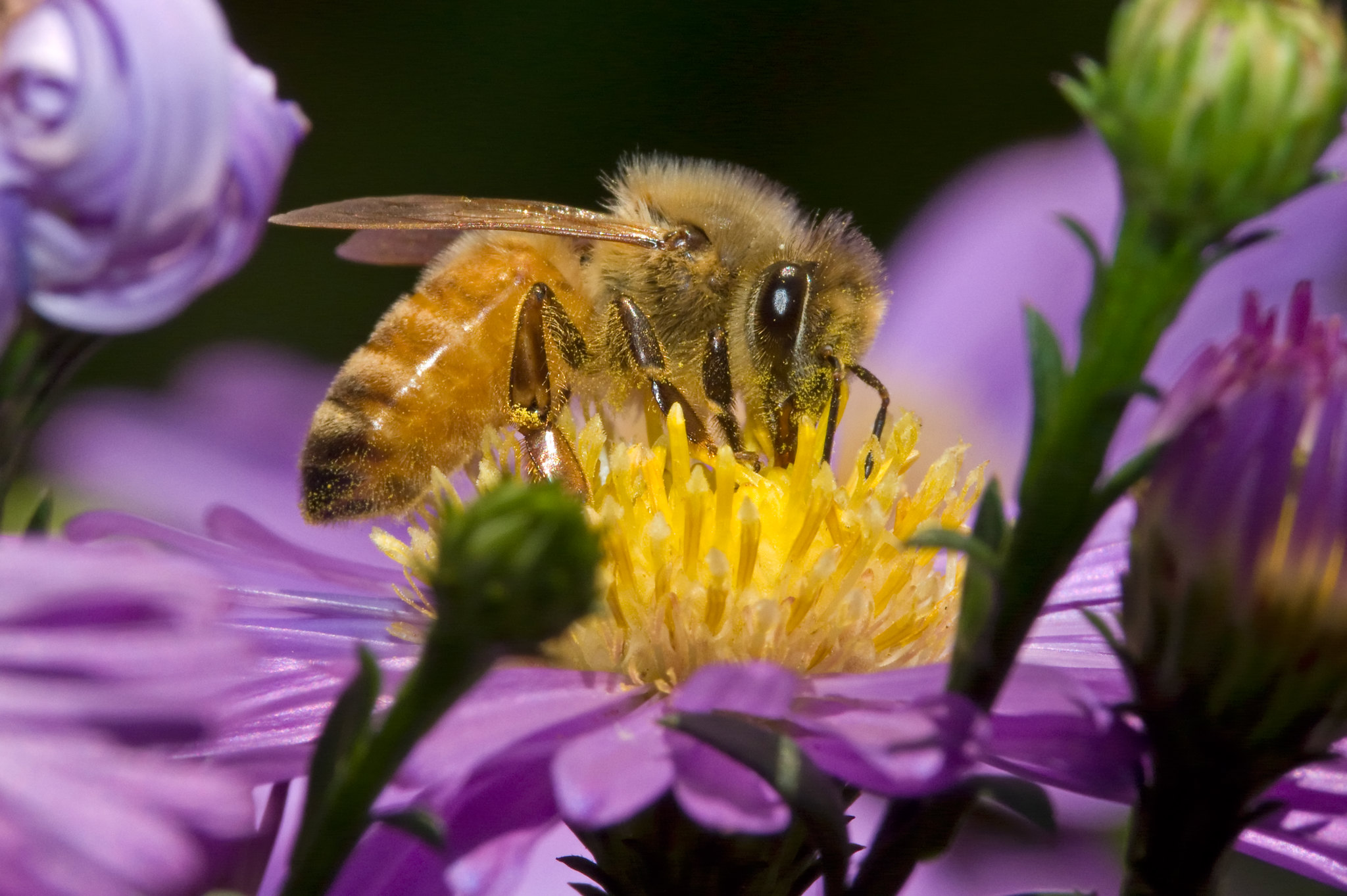Roundup may harm honeybee gut health
The popular weed killer could impair honeybees’ immune systems, leaving them vulnerable to infections
Casey Crownhart • January 25, 2021

Honeybees can be exposed to pesticides while gathering contaminated flower nectar. [Credit: Cory Barnes | CC BY-SA 2.0]
Honeybees exposed to Roundup may be more susceptible to infections and other adverse health effects, according to a new study. Researchers found that the ubiquitous weed killer could harm honeybee populations by killing their beneficial gut bacteria, clearing the way for life-threatening pathogens.
Honeybees play an essential role in agriculture as pollinators: Crop pollination by honeybees contributes over $11 billion to the U.S. economy annually, according to a 2012 study. Despite their importance, these tiny essential workers have been facing colony collapse disorder and other forms of population decline for over a decade, and the exact causes are still not well understood.
Previous studies have hinted that pesticides can harm honeybees. To that end, biologists at the University of Texas at Austin decided to look into one of the world’s most popular weed killers — Roundup. The results were published in the September 2020 issue of Applied and Environmental Microbiology.
As part of the study, the researchers exposed a group of 350 honeybees housed in outdoor hives to sugar water laced with Roundup. Meanwhile, another 350 bees were exposed to plain sugar water as a control. After several days, the researchers recaptured 97 Roundup-exposed bees and 154 non-exposed bees and brought them back to the lab to take a closer look at their gut bacteria and overall health.
Roundup exposure had killed off a large fraction of a bacteria called Snodgrassella alvi. Snodgrassella is one of the “core members” of the honeybee gut microbiome, and it plays a role in honeybees’ immune systems, says Erick Vicente da Silva Motta, a postdoctoral fellow in integrative biology at the University of Texas at Austin and a co-author of the study.
Motta and his team quickly saw the effects of Snodgrassella loss: When the team exposed two groups of captured bees in another experiment to Serratia marcescens — a pathogenic bacteria — around 30% of the bees that had been exposed to Roundup died within 10 days, compared to the 20% mortality rate in the control group.
In an emailed statement, Roundup’s manufacturer, Bayer, says their Roundup products are “extensively tested” to show that they “do not adversely affect larval and adult honeybees in acute and chronic exposures in laboratory, semi-field, and field studies. The findings of this study do not change those conclusions.”
Bayer added that effects on the bees in this study were “only observed at levels that greatly exceed environmentally realistic field exposure concentration.”
Motta, however, disagrees. In the study, Snodgrassella was affected by a 0.1% concentration of Roundup, which Motta points out was even lower than the instructed concentration — 0.4% to 7% — on Roundup’s label. Although Motta and his team have not detected Roundup at levels as high as 0.1% in natural settings, he says the study’s conditions are totally possible for honeybees to encounter if Roundup users follow the product label.
Still, Motta says more studies are needed to further investigate the weed killer’s impact on honeybees in nature. While some bees might be sprayed directly with Roundup, others likely encounter pesticides in water and food sources after they are naturally diluted by rain or irrigation, so it’s not clear how often honeybees might encounter Roundup at a high enough concentration to cause harm, says Motta.
In addition to Roundup’s impact on bee gut bacteria, Motta says the pesticide is also harming bees by killing the weeds and wildflowers that these critters rely on for food.
Some researchers worry that although Roundup may not kill off bees single-handedly, it can cause substantial harm when combined with other threats like pathogenic bacteria and loss of food sources. “I don’t think exposure to Roundup by itself is killing any colonies,” says Reed Johnson, an entomologist at The Ohio State University who was not involved in the study. “But Roundup exposure, in combination with the many stressors that are facing bees, may be the straw that breaks the camel’s back.”